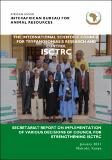| dc.contributor.author | AU-IBAR | |
| dc.date.accessioned | 2022-02-17T07:08:16Z | |
| dc.date.available | 2022-02-17T07:08:16Z | |
| dc.date.issued | 2011-01 | |
| dc.identifier.uri | http://repository.au-ibar.org/handle/123456789/1184 | |
| dc.description | This report was prepared by the ISCTRC Secretariat and contains recommendations on the implementation of the various decisions of the Council for strengthening ISCTRC, as recommended in
the 2006 Consultants Report “Strengthening the International Council for Trypanosomiasis Research
and Control (ISCTRC): Meeting the Challenges of the Present and the Future” and in various minutes and
reports of the Council. | en |
| dc.description.abstract | The International Scientific Council for Trypanosomiasis Research and Control (ISCTRC) is a strategic
partnership platform to promote international cooperation in the fight against trypanosomiasis, a disease that is one of Africa’s greatest constraints to socio-economic development and that severely affects human and livestock health, limits livestock productivity and land use, causes poverty and
perpetuates underdevelopment on the continent. It is a statutory council of the African Union with the Secretariat based at AU-IBAR, Nairobi, Kenya. ISCTRC was established in 1949 and became an organ of OAU, now AU, in 1963. | en |
| dc.description.sponsorship | AU-IBAR | en |
| dc.language.iso | en | en |
| dc.publisher | AU-IBAR | en |
| dc.subject | ISCTRC | en |
| dc.subject | Pan African Tsetse and Trypanosomosis Eradication Campaign (PATTEC) | |
| dc.title | Secretariat Report on Implementation of Various Decisions of the Council for Strengthening ISCTRC January 2011 Nairobi, Kenya | en |
| dc.title.alternative | The International Scientific Council for Trypanosomiasis Research and Control ISCTRC | en |
| dc.type | Report | en |
